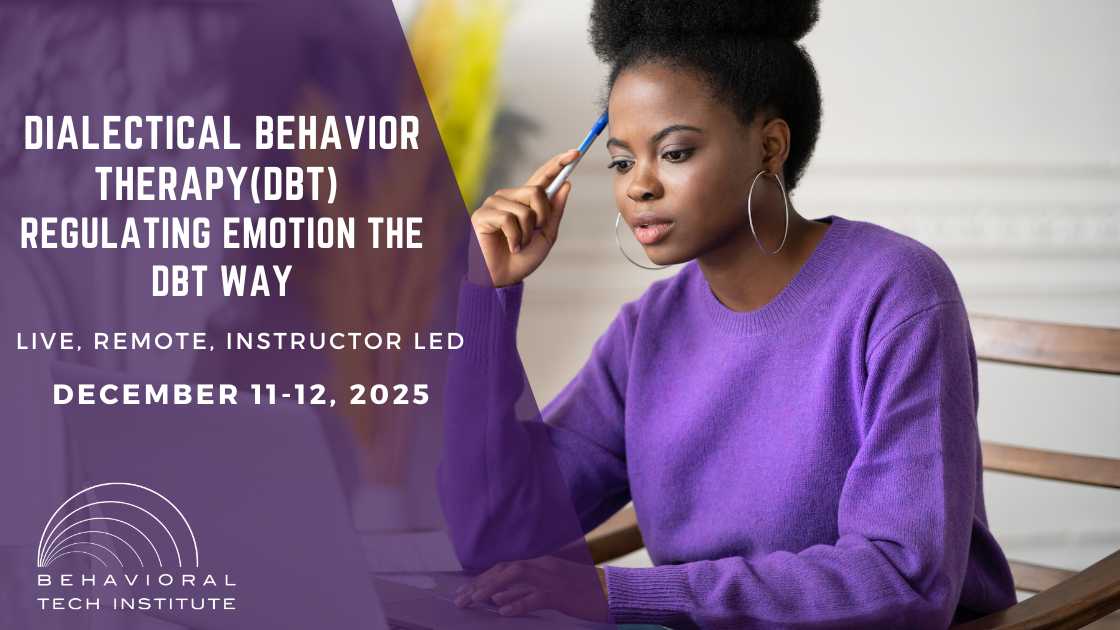To learn more about the types of training and consultation that BTECH offers, visit our Training Catalog here.
Interested in a training that is sold out? Please join our Waiting List so we can contact you as we schedule future events.

Regulating Emotion the DBT way

Live, Remote, Instructor-led
Sign in: 8:30am-9:00am CST
Start time: 9:00am CST – 4:30pm CST
Trainer: Christine Dunkley, DClinP
Co Trainer: Gwen Abney-Cunningham, LMSW
Training Description
Purpose: This training addresses the moment-by-moment steps involved in coaching the client to regulate an emotion.
Content: This training will cover tips and strategies for managing common pitfalls in upregulating or downregulating each emotion to fit the facts. Participants will be shown how to troubleshoot to ensure the client has genuinely grasped the skill.
Length & Schedule: This course consists of 8 modules for a total of 11 instructor-led hours, which is delivered over 2 days.
For Whom: This course is intended for DBT and other therapists working with clients who have dysregulated emotions. This training is intended for mental health professionals who work in a therapeutic role and who would like to learn more about coaching emotion regulation. No prerequisites are needed to join this course, but it is advisable to have some previous training in DBT.
Core Description:
The role of strengthening and generalizing emotion regulation skills falls to the individual therapist. Clients may have read about emotion regulation or learned the skills in DBT skills training groups but still tend to over-rely on distraction or distress tolerance when these skills are called for in everyday life. In this workshop, participants will learn the moment-by-moment steps involved in coaching the client to regulate an emotion. The trainer will share some top tips on managing the common pitfalls in upregulating or downregulating each emotion to fit the facts. Participants will be shown how to troubleshoot to ensure the client has genuinely grasped the skill.
Learning Objectives:
Module ER01: What is emotion regulation?
1. Describe what is meant by “dialectical”.
2. Explain why emotions get dysregulated.
3. List emotion signatures and why we use them.
4. Outline the steps in emotion regulation.
Module ER02: Behavioral chain analysis
1. Explain how to hone in on the context in a chain analysis.
2. Describe the steps in behavioral chain analysis.
3. Demonstrate how to separate out emotions.
4. Describe how to regulate secondary emotions.
5. Describe common errors in behavioral chain analyses (BCA).
Module ER03: Anger and Guilt
1. Describe when anger matches the facts.
2. Explain signature features and opposite actions for anger.
3. List special issues involved in regulating anger.
4. Describe when guilt matches the facts.
5. Describe signature features and opposite actions for guilt.
6. Explain special issues for regulating guilt.
Module ER04: Emotion Validation
1. Explain what is meant by validation.
2. Describe effects of invalidation.
3. Demonstrate how to avoid insufficient or superficial validation.
Module ER05: Shame and Disgust
1. Describe situations where shame matches the facts.
2. Explain signature features and opposite actions for shame.
3. List special issues related to regulating shame.
4. Explain when disgust matches the facts.
5. Describe signature features and opposite actions for disgust.
6. List special issues for regulating disgust.
Module ER06: Sadness
1. Describe when sadness matches the facts.
2. Explain signature features and opposite actions for sadness.
3. List Special issues when regulating sadness.
4. Demonstrate the steps in regulating sadness.
Module ER07: Fear, Jealousy, and Envy
1. Describe when fear matches the facts.
2. Explain Signature features and opposite actions for fear.
3. List special issues regulating fear.
4. Describe when envy and jealousy match the facts.
5. Explain opposite actions for jealousy and envy.
6. List special issues for regulating jealousy and envy.
Module ER08: Problem-solving
1. Describe obstacles to problem-solving.
2. Explain solutions for the valid part of emotions.
3. Demonstrate practical problem solving.
4. Summarize steps in emotion regulation.
Schedule
December 11-12, 2025
7:00am – 2:30pm Pacific Time / 9:00am-4:30pm Central Time / 10:00am-5:30pm Eastern Time
Sign-In from 6:30am – 7:00am Pacific Time / 8:30am-9:00am Central Time / 9:30am-10:00am Eastern Time
Trainers
Christine Dunkely, DClinP

 Christine Dunkley, DClinP, is a consultant trainer with the British Isles DBT Training team and honorary lecturer on the Post Graduate Diploma in DBT at Bangor University. She has a doctorate in Clinical Practice from the school of health sciences at the University of Southampton, and an honours degree and certificate of qualification in Social work. She began working as a medical social worker in 1982 and a psychological therapist in 1994. She is an accredited therapist and supervisor with the Society for DBT (UK and Ireland) and a senior accredited practitioner with BACP. She is a Fellow and Vice President of SfDBT. Christine trained in DBT in 2001 and had supervision with Heidi Heard who worked on the original trials with Marsha Linehan. She is trained to calibration in the University of Washington DBT adherence rating scale. She worked in the Winchester DBT team and specialised in seeing the patients who were at the point of being referred into expensive out-of-area placements because of more severe difficulties than could be handled in routine care. She and the team received an award from the Trust for their work on this service. She trained and supervised clinicians on the 5-year Implementation of DBT in Ireland, and was a consultant on the pilot site for a large NHS RCT in RO-DBT. Christine started offering training in DBT internally at Southern Health NHS Trust where she was employed. She joined the British Isles DBT training team in 2006, eventually rising to Consultant trainer. She has trained on 48 intensives, 26 Foundation courses, and over 200 workshops, making her the most prolific trainer in the British Isles DBT training team, and one of the most experienced trainers worldwide. She has given an exemplar lecture at the annual DBT trainers meeting in Seattle, and taught on the Linehan Institute induction program for new international trainers. Since writing her books on Mindfulness and Emotion Regulation she has also been in demand as a speaker all over the world, in person and online.
As a very experienced trainer she has consulted on difficult cases in every setting imaginable, from prisons, to perinatal units, and from specialist PD services to community treatment teams, with both adolescent and adult clients. She is well recognised for her expertise. She was the first chair of the Society for DBT (UK and Ireland) and awarded a fellowship for her services in 2016. She has written over 20 publications including 3 books, and 3 chapters in the Handbook of DBT edited by Michaela Swales. Her article based on her research into Hearing the Suicidal Patient’s Emotional Pain topped the ‘most read’ chart in Crisis journal for over a year. Her co-authored paper with Michaela Swales on Skills Assessment in DBT was given an honorary mention in the 2021 Psyche awards.
Christine Dunkley, DClinP, is a consultant trainer with the British Isles DBT Training team and honorary lecturer on the Post Graduate Diploma in DBT at Bangor University. She has a doctorate in Clinical Practice from the school of health sciences at the University of Southampton, and an honours degree and certificate of qualification in Social work. She began working as a medical social worker in 1982 and a psychological therapist in 1994. She is an accredited therapist and supervisor with the Society for DBT (UK and Ireland) and a senior accredited practitioner with BACP. She is a Fellow and Vice President of SfDBT. Christine trained in DBT in 2001 and had supervision with Heidi Heard who worked on the original trials with Marsha Linehan. She is trained to calibration in the University of Washington DBT adherence rating scale. She worked in the Winchester DBT team and specialised in seeing the patients who were at the point of being referred into expensive out-of-area placements because of more severe difficulties than could be handled in routine care. She and the team received an award from the Trust for their work on this service. She trained and supervised clinicians on the 5-year Implementation of DBT in Ireland, and was a consultant on the pilot site for a large NHS RCT in RO-DBT. Christine started offering training in DBT internally at Southern Health NHS Trust where she was employed. She joined the British Isles DBT training team in 2006, eventually rising to Consultant trainer. She has trained on 48 intensives, 26 Foundation courses, and over 200 workshops, making her the most prolific trainer in the British Isles DBT training team, and one of the most experienced trainers worldwide. She has given an exemplar lecture at the annual DBT trainers meeting in Seattle, and taught on the Linehan Institute induction program for new international trainers. Since writing her books on Mindfulness and Emotion Regulation she has also been in demand as a speaker all over the world, in person and online.
As a very experienced trainer she has consulted on difficult cases in every setting imaginable, from prisons, to perinatal units, and from specialist PD services to community treatment teams, with both adolescent and adult clients. She is well recognised for her expertise. She was the first chair of the Society for DBT (UK and Ireland) and awarded a fellowship for her services in 2016. She has written over 20 publications including 3 books, and 3 chapters in the Handbook of DBT edited by Michaela Swales. Her article based on her research into Hearing the Suicidal Patient’s Emotional Pain topped the ‘most read’ chart in Crisis journal for over a year. Her co-authored paper with Michaela Swales on Skills Assessment in DBT was given an honorary mention in the 2021 Psyche awards.
Gwen Abney-Cunningham, LMSW

 Kalamazoo, MI (United States)
Gwen Abney-Cunningham, LMSW, is currently a fulltime Behavioral Tech consultant and trainer. Prior to coming to Behavioral Tech full time, she was employed at a community mental health agency for 32 years, in many roles, including; DBT Services Supervisor, Outpatient Services Director, and most recently as Evidenced Based Treatment Director. Gwen received her bachelor’s degree from Hope College and her MSW from Grand Valley State University. She has 30 plus years of professional experience and is a member of one of the first teams in the U.S. to apply DBT within an ACT program. Gwen is intensively trained in DBT and an experienced workshop leader at state, national, and international conferences. Gwen continues to work as a DBT therapist because it is effective and the hope it brings to clients and their families. As a BTECH Trainer and consultant, she is also able to assist many mental health providers in learning the treatment to assist in helping many individuals.
Gwen’s experience in DBT includes individual and skills training for adults, adolescents and families and providing DBT supervision to clinicians. In addition, she has assisted in the development and implementation of DBT on ACT teams and in outpatient settings. Gwen has been involved with the large-scale implementations of DBT in Michigan for Community Mental Health settings. She has been a Behavioral Tech trainer for 20 plus years. Gwen has also served on the Behavioral Tech Trainer Advisory Committee and the Behavioral Tech Implementation Science Workgroup.
Kalamazoo, MI (United States)
Gwen Abney-Cunningham, LMSW, is currently a fulltime Behavioral Tech consultant and trainer. Prior to coming to Behavioral Tech full time, she was employed at a community mental health agency for 32 years, in many roles, including; DBT Services Supervisor, Outpatient Services Director, and most recently as Evidenced Based Treatment Director. Gwen received her bachelor’s degree from Hope College and her MSW from Grand Valley State University. She has 30 plus years of professional experience and is a member of one of the first teams in the U.S. to apply DBT within an ACT program. Gwen is intensively trained in DBT and an experienced workshop leader at state, national, and international conferences. Gwen continues to work as a DBT therapist because it is effective and the hope it brings to clients and their families. As a BTECH Trainer and consultant, she is also able to assist many mental health providers in learning the treatment to assist in helping many individuals.
Gwen’s experience in DBT includes individual and skills training for adults, adolescents and families and providing DBT supervision to clinicians. In addition, she has assisted in the development and implementation of DBT on ACT teams and in outpatient settings. Gwen has been involved with the large-scale implementations of DBT in Michigan for Community Mental Health settings. She has been a Behavioral Tech trainer for 20 plus years. Gwen has also served on the Behavioral Tech Trainer Advisory Committee and the Behavioral Tech Implementation Science Workgroup.
Prerequisites
Preparation & Training Requirements:
No prerequisites are needed to join this course, but it is advisable to have some previous training in DBT.
Study Resources
Reading for Regulating Emotion the DBT way:
Dunkley, C. (2021). Regulating emotion the DBT way: A therapist’s guide to Opposite Action. Routledge/Taylor & Francis Group.
Attend
Tuition Information
- Early Bird Tuition: $525 per participant (U.S. dollars) | Discount ends September 25, 2025
- Standard Tuition: $575 per participant (U.S. dollars)
- Registration will close when all seats are sold, or on December 5th, 2025 (final cut-off date)
IMPORTANT: Two weeks prior to the training, participants will receive an email from our Online Portal (powered by Thinkific) with a sign-in URL for this training. Please follow the instructions in the email to log in to our Online Portal and set your password, one week before the training.
Participants will retain access to the online course until 1 month after the last training session date. All course requirements must be completed before course access expires.
Please email support@behavioraltech.org if you have any questions about accessing your training.
Cancellations, Substitutions and Refunds
For a complete list of Behavioral Tech policies and limits of liability, see our Sales & Refund Policy page.
Technical Requirements
- Our Online Portal (powered by Thinkific) will be used to host the live Zoom sessions and share supplemental materials.
- Participants are responsible for printing out their materials in the online portal.
- All Live-Remote Trainings require each participant to have:
- A high-speed Internet Service Connection with a minimum speed of 5Mbps. Test your internet speed.
- The most recent version of any of the following web-browsers: Google Chrome, Firefox , Safari , Microsoft Edge (Please note Internet Explorer will not be supported)
- Web-browser configurations must have Javascript enabled and popup blockers disabled.
- The following software applications: Zoom, Microsoft Word, Microsoft Excel, A PDF reader such as Adobe Acrobat Reader, or the ability to view PDFs in a web-browser. To test your internet connection, camera, and microphone for Zoom, you can use Zoom’s testing application.
- No firewall restrictions. If a firewall is installed, please be aware that may interfere with the training content and materials, as it may be blocked. Please include the following 3rd party services to trusted sites list(s):
- Thinkific Learning Management System: https://behavioraltech.thinkific.com/
- SurveyMonkey: https://www.surveymonkey.com/
- Zoom: https://zoom.us/
Continuing Education
This offering meets the requirements for the following hours by discipline. Licensing and continuing education requirements vary by state. Please contact your state’s regulatory authority to verify if this course meets your licensing or continuing education requirements. Inquiries regarding CE for other disciplines not listed may be directed to Behavioral Tech via email (support@behavioraltech.org).
CE NOTE: Behavioral Tech calculates the continuing education credits for this training by the start time and end time. 100 percent attendance is required, as is signing IN and OUT each morning and afternoon, to receive CE credits. Only participants with 100% attendance, and who have completed the Post-Event Evaluation and passed their Final Exam with a score of 75% or higher will receive credit. Behavioral Tech cannot offer partial credit. Please remember to sign in and sign out each day to document your attendance. Continuing Education documentation will be emailed to you 4-6 weeks after the last day of training.
Mental Health Counselors
Behavioral Tech is approved by an NBCC-Approved Continuing Education Provider (ACEP™) and may offer NBCC-approved clock hours for events that meet NBCC requirements. For this joint offering, Behavioral Tech Institute will apply to NBCC for additional review and approval. The ACEP solely is responsible for all aspects of the program. Behavioral Tech will email you a letter documenting your attendance upon the successful completion of the activity. The allocated clock hours for this activity = 11.
Psychologists
Behavioral Tech is approved by the American Psychological Association to offer continuing education for psychologists. Behavioral Tech maintains responsibility for the program and its content. This activity is being jointly provided by Behavioral Tech Institute and British Isles DBT Training. Behavioral Tech will email you a letter documenting your attendance after the successful completion of the program and homework. The number of hours Behavioral Tech has allocated for this activity = 11.
Psychologists – New York
Behavioral Tech is recognized by the New York State Education Department’s State Board for Psychology as an approved provider of continuing education for licensed psychologists, #PSY-0063. Behavioral Tech will email a certificate of attendance upon 100% completion of this activity. The total contact hour allocated for this activity = 11.
Social Workers- Washington
Behavioral Tech will apply to the NASW, Washington State Chapter, Provider Number 1975-166, to offer continuing education for Certified Social Workers. Behavioral Tech will email a certificate of attendance upon 100% completion of this activity. The hours of CE allocated for this activity = 11.
Social Workers – New York
Behavioral Tech is approved by recognized by the New York State Education Department’s State Board for Social Work as an approved provider of continuing education for licensed social workers, #0040. Behavioral Tech will email a letter documenting attendance to participants with 100% completion of the program and homework. The hours allocated for this activity = 11.
General CE/CME Disclosures and Policies
Conflict of interest definition: A conflict of interest may be considered to exist if a continuing education course faculty is affiliated with, or has any significant financial interest, in any organization(s) that may have a direct interest in the subject matter of the presentation or may be co-sponsoring or offering financial support to the course. Situations involving a potential conflict of interest are not inherently bad or wrong, but in accordance with standards for continuing medical education we would like you to be aware of the affiliation/financial interest of your instructors.
Faculty Disclaimer: When an unlabelled use of a commercial product, or an investigative use not yet approved for any purpose is discussed during an educational activity, we shall require the speaker to disclose that the product is not labeled for the use under discussion or that the product is still investigative.
Notice of requirements for successful completion: For all trainings (both in-person and remote), participants must attend 100% of the training and complete the Final Evaluation to receive a certificate of successful completion. This includes signing in and out each day/session of the event. For remote, Instructor-led online training, participants have to pass the Post Assessment(s) with a score of 75% or higher.
Commercial support or sponsorship: There is no commercial company support for this CME/CE event.
Noncommercial Sponsor Support: There is no noncommercial sponsor support for this CME/CE activity.
Non-Endorsement of Products: The Behavioral Tech approval status refers only to continuing education activities and does not imply that there is real or implied endorsement of any product, service, or company referred to in this activity nor of any company subsidizing costs related to the activity.
Off-Label Product Use: This CME/CE activity does not include any unannounced information about off-label use of a product for a purpose other than that for which it was approved by the Food and Drug Administration (FDA).
Disclosure of Relevant Financial Relationships: Faculty members are required to disclose all conflicts of interest and any relevant financial relationships that may affect the training content. Unless specified on Behavioral Tech’s website or on other printed materials/media, none of the individuals in a position to control the content of this CE/CME activity (including planners, editors, CE/CME Review Committee members, faculty presenters, moderators/facilitators, reviewers, etc.) have any relevant financial relationships to disclose.
CE Reprint Policy: For missing/lost CE documentation, an administrative fee of $50 is required for all CE/CME activities after 2017. For CE reprints prior to 2017, please refer to the website or contact support@behavioraltech.org.
Not finding the training you’re looking for? Check out our services for agencies and systems to learn if we can bring a training to you!